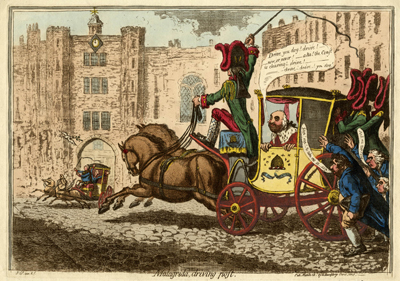Malagrida Driving Post
This print shows the Marquess of Lansdowne (aka Earl of Shelburne) in his best coach on the way to St. James's Palace. If the five o'clock shadow of his beard were not enough to identify him, Lansdowne's crest and motto figure prominently on the coach door. At the window, Lansdowne urges his coachman to make haste: "Drive you dog!. drive!" Dressed in peer's robes, he anticipates the possibility of being asked to form a new government replacing that of William Pitt: "aha! the Coast is clearing!_ drive!" Behind the carriage, fellow Whigs, including Fox, Sheridan, and Michael Angelo Taylor clamor to join him. For his part, Pitt is shown leaving the Palace in a coach nominally "driven" by his right hand man, the Scot Henry Dundas (in tartan). But both Pitt and Dundas are upset and distracted by a dove of peace flying above them, and have lost control of the carriage.

© Trustees of the British Museum
In the weeks preceding the publication of this print, there was significant and persistent criticism of the Pitt administration for its Russia policy. In order to defend their ally, the Turkish Grand Vizier, and perhaps even more importantly, to prevent Russia from upsetting the balance of power in Europe, Pitt had deployed a fleet of thirty-six ships to the Baltic and demanded that the Empress of Russia return the area which had been seized by the Russians during the Russo-Turkish wars, including the port of Ochakov and its district. Pitt's threat was to be backed up by 80,000 Prussians as well as Turks and Poles with whom Russia was already at war. But Russia refused to back down, and for the sake of peace the Turkish Grand Vizier chose to cede the disputed territory as part of the treaty of Jassy in January 1792. Pitt was forced to revoke his ultimatum, and the British effort and expense came to nought.
In the wake of this fiasco according to The European Magazine for March 1st, 1792, Pitt's administration was accused of pursuing treaties without Parliamentary knowledge and approval, of
continuing an Armament after the object for which it was proposed had been relinquished, having been guilty of gross misconduct, tending to incur unnecessary expenses, and [diminishing] the influence of the British Nation in Europe.
This much was public knowledge and covered by several newspapers in late February and early March. But this only explains why the dove of peace in Gillray's print may be causing such consternation in Pitt's carriage. Where does Lansdowne come in?
With the aid of contemporary letters and manuscripts from Pitt, Lansdowne, and others, we now know that there were rumours (discounted by Pitt) of a possible change of administration, and that Lansdowne prepared a memo discussing the pros and cons of such a move. But it is still unclear whether the memo was ever discussed with the King or whether the King ever seriously considered replacing Pitt. What IS clear is that Gillray must have had enough access to get wind of these rumors and to create the plausible satiric narrative we see here.
In that narrative, everyone looks bad. Lansdowne is portrayed as pretentious and over-eager is his quest for power and his identification with the traitorous Malagrida is once again resurrected. Fox and the other Whigs appear desperate and servile as they try to take advantage of Lansdowne's apparent good fortune. And the ministerial group of Pitt and Dundas look simply incompetent as their carriage veers out of control as it leaves the palace grounds. Who were Gillray's sources? How did he obtain what would seem to have been privileged (and mostly accurate) information? This print appears five years before Gillray obtained a pension from the Tory government that gave him identiable sources within the higher reaches of government. We'll probably never know for sure. But I can imagine Gillray sitting alone in a pub listening as a couple of members of Parliament who have had a few too many stimulants discuss the latest gossip a little too freely and a little too loudly. And I can imagine him smiling.
Sources and Reading
- Commentary from the British Museum on Malagrida Driving Post.
- "William Petty, 2nd Earl of Shelburne," Wikipedia
- Life of William, Earl of Shelburne
- "William Pitt the Younger," Wikipedia
- "Gabriel Malagrida," Wikipedia
- William Pitt and the Great War
- Robert Harvey, The War of Wars, 2006, Ch 14, The Russian Ogre.
- Thomas Wright and R.H. Evans, Historical and Descriptive Account of the Caricatures of James Gillray # 77
- Thomas Wright and Joseph Grego, The Works of James Gillray, the Caricaturist; With the History of His Life and Times pp. 139-40.
Comments & Corrections
NOTE: Comments and/or corrections are always appreciated. To make that easier, I have included a form below that you can use. I promise never to share any of the info provided without your express permission.